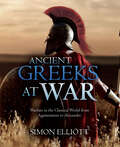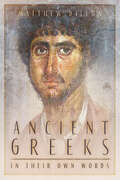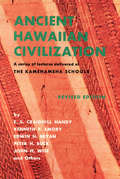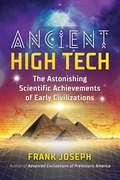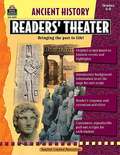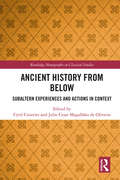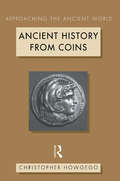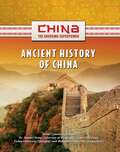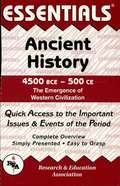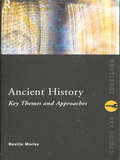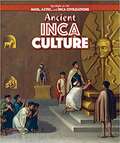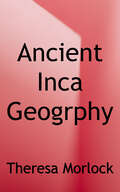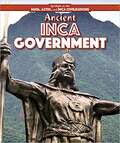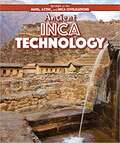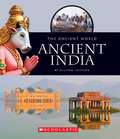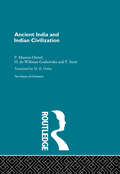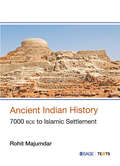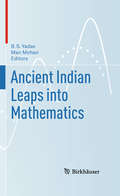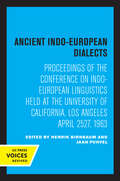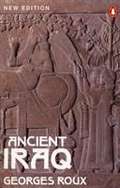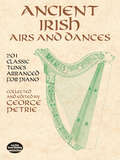- Table View
- List View
Ancient Greeks at War: Warfare in the Classical World from Agamemnon to Alexander
by Simon Elliott&“A detailed, insightful survey of Greek warfare&” with illustrations and &“many well-informed and highly perceptive observations&” (Choice). In this book, historian and archaeologist Simon Elliott considers the different fighting styles of Greek armies and discusses how Greek battles unfolded. Covering every aspect of warfare in the Ancient Greek world from the beginnings of Greek civilization to its assimilation into the ever-expanding world of Rome, it begins with the onset of Minoan culture on Crete around 2000 BC, then covers the arrival of the Mycenaean civilization and the ensuing Late Bronze Age Collapse before moving on to Dark Age and Archaic Greece. This sets the scene for the flowering of Classical Greek civilization, as told through detailed narratives of the Greek and Persian Wars, the Peloponnesian Wars, and the rise of Thebes as a major power. The book then moves on to Macedonian domination under Philip II, before focusing on the exploits of his son Alexander the Great, the all-conquering hero of the ancient world. His legacy was the Hellenistic world with its multiple, never-ending series of conflicts that took place over a huge territory, ranging from Italy in the west all the way to India in the east. Topics covered include the various Wars of the Successors, the rise of the Bactrian-Greek and Indo-Greek kingdoms, the wars between the Antigonid Macedonian, Seleucid, and Ptolemaic kingdoms, and later the clash of cultures between the rising power of Rome in the west and the Hellenistic kingdoms. In the long run the latter proved unable to match Rome&’s insatiable desire for conquest in the eastern Mediterranean, and this together with the rise of Parthia in the east ensured that one by one the Hellenistic kingdoms and states fell. The book ends with the destruction of Corinth in 146 BC after the defeat by Rome of the Achaean League—and concludes by considering the legacy of the Ancient Greeks in the Roman world, and subsequently. &“A comprehensive survey, smoothly written by an expert popularizer of ancient history. A tour de force.&” —NYMAS Review
Ancient Greeks in Their Own Words: History And Culture From Archaic Times To The Death Of Alexander
by Matthew DillonThis volume offers an eyewitness account of life in the classical world. The author has selected a series of telling extracts from Greek literature to provide a picture of the customs, concerns and underlying values of the ancient Greeks. The Greeks speak for themselves, both in the formal language of public office and in the colloquial speech of the household and the street. Their words reveal activities and opinions which are sometimes remarkably similar to those of the modern day, but which are otherwise so different that they are difficult for us to understand. The extracts have been selected from a variety of sources and record not only the lives of famous Greeks, but - perhaps more importantly - offer an insight into the lives of more ordinary individuals. Poetry, hymns and war-songs are included, as are quotations from official documents, inscriptions, laws, histories, funerary monuments, war-memorials and graffiti. This compilation gives an impression of the public and private facets of Greek life, providing an insight into the mentality of the Greeks.
Ancient Hawaiian Civilization
by e. s. Craighill HandyAncient Hawaiian Civilization takes us back to Hawaii's " stone age," when there wasn't an alphabet, numbering system, or other civilized distinctions as we know them. Still rules of living, modes, and customs permitted large numbers of people to live healthfully and happily throughout the islands.This fascinating history of Hawaii is " must" reading for anyone who has been, wants to go, or lives in America 's 50th State. This book authoritatively introduces the general reader to what was once a golden era of Hawaiian history and culture, the time when the islands were strictly Hawaiian Hawaii. Though the islands are almost completely westernized today, many facets from this golden age remain to make America's 50th State a " living laboratory" for the cultural and social study of racial migration and assimilation. This volume represents the knowledge and experience of no less than 16 scholars.The combined areas of specialization by no less than 16 authors have been carefully selected and grouped to make up this volume. Together, the authors comprise a truly formidable forum of Hawaiian thought and learning. Ethnologists, geologists, zoologists, and medical doctors are but a few of the areas of specialization represented in these pages.
Ancient Hawaiian Civilization
by e. s. Craighill HandyAncient Hawaiian Civilization takes us back to Hawaii's " stone age," when there wasn't an alphabet, numbering system, or other civilized distinctions as we know them. Still rules of living, modes, and customs permitted large numbers of people to live healthfully and happily throughout the islands.This fascinating history of Hawaii is " must" reading for anyone who has been, wants to go, or lives in America 's 50th State. This book authoritatively introduces the general reader to what was once a golden era of Hawaiian history and culture, the time when the islands were strictly Hawaiian Hawaii. Though the islands are almost completely westernized today, many facets from this golden age remain to make America's 50th State a " living laboratory" for the cultural and social study of racial migration and assimilation. This volume represents the knowledge and experience of no less than 16 scholars.The combined areas of specialization by no less than 16 authors have been carefully selected and grouped to make up this volume. Together, the authors comprise a truly formidable forum of Hawaiian thought and learning. Ethnologists, geologists, zoologists, and medical doctors are but a few of the areas of specialization represented in these pages.
Ancient High Tech: The Astonishing Scientific Achievements of Early Civilizations
by Frank JosephA detailed look into ancient advanced technology, science, and medicine--some of which has yet to be reproduced today • Explores countless examples of ancient high tech, including robotics, artificial intelligence, aircraft, solar-powered cannons, high-speed drills, illuminated underground temples, massive refrigerators, and subterranean cities • Examines evidence of advanced medicine in ancient times • Includes examples from ancient Egypt, China, Greece, Babylon, Siberia, the Americas, and India The first self-igniting match was invented in 1805 by Jean Chancel, a French chemist. Yet, in Babylon, 3,600 years before, identical sulfur matches were in common use. On the Panchavarnaswamy Temple in India, built millennia ago, there is a detailed carving of a man on a bicycle, yet the bicycle wasn&’t invented in the modern world until 1817. These inventions are only two examples of technology lost in the Dark Ages. Exploring the sophisticated tech achieved by ancient civilizations hundreds and thousands of years ago, Frank Joseph examines evidence of robotics and other forms of artificial intelligence; manned flight, such as hot-air balloons and gliders; and military science, including flamethrowers, biological warfare, poison gas, and solar-powered cannons. He reveals how ancient construction engineers excavated subterranean cities, turned stone walls into glass, lifted 100-ton blocks of granite, illuminated underground temples and pyramids, and stored their food in massive refrigerators. Examples explored in the book include the first known alarm clock, invented by Plato in 4th-century-BC Greece; 600-year-old Aztec whistles that reproduce animal sounds and human voices with uncanny accuracy; Stone Age jewelry from Siberia worked by a high-speed drill; sex robots in ancient Troy, Greece, and China; ancient Egyptian aircraft; and India&’s iron pillar exposed to sixteen hundred years of monsoons but still standing rust-free. The author also explores evidence of advanced medicine in ancient times, particularly in Egypt and China, from brain surgery, optometry, and prosthetics to dentistry, magnet therapy, and cancer cures.By examining the achievements of our ancient ancestors, we can not only reverse-engineer their inventions but also learn from their civilizations&’ mistakes, enabling us to avoid more dark ages. Imagine how scientifically advanced humanity would be if our early achievements had escaped destruction and been allowed to develop?
Ancient History Readers' Theater, Grades 5-8
by Robert Smith"Original scripts based on historic events and highlights; introductory background information to set the stage for each script; reader's response and extension activities; convenient, reproducible pull-out scripts for each student."
Ancient History from Below: Subaltern Experiences and Actions in Context (Routledge Monographs in Classical Studies)
by Cyril Courrier Julio Cesar Magalhães de OliveiraIf ancient history is particularly susceptible to a top-down approach, due to the nature of our evidence and its traditional exploitation by modern scholars, another ancient history—‘from below’—is actually possible. This volume examines the possibilities and challenges involved in writing it. Despite undeniable advances in recent decades, ‘our slowness to reconstruct plausible visions of almost any aspect of society beyond the top-most strata of wealth, power or status’ (as Nicholas Purcell has put it) remains a persistent feature of the field. Therefore, this book concerns a historical field and social groups that are still today neglected by modern scholarship. However, writing ancient history ‘from below’ means much more than taking into account the anonymous masses, the subaltern classes and the non-elites. Our task is also, in the felicitous expression coined by Walter Benjamin, ‘to brush history against the grain,’ to rescue the viewpoint of the subordinated, the traditions of the oppressed. In other words, we should understand the bulk of ancient populations in light of their own experience and their own reactions to that experience. But, how do we do such a history? What sources can we use? What methods and approaches can we employ? What concepts are required to this endeavour? The contributions mainly engage with questions of theory and methodology, but they also constitute inspiring case studies in their own right, ranging from classical Greece to the late antique world. This book is aimed not only at readers working on classical Greece, republican and imperial Rome and late antiquity but at anyone interested in ‘bottom-up’ history and social and population history in general. Although the book is primarily intended for scholars, it will also appeal to graduate and undergraduate students of history, archaeology and classical studies.
Ancient History from Coins (Approaching the Ancient World)
by Christopher HowgegoLike other volumes in this series, Ancient History from Coins demystifies a specialism, introducing students (from first year upwards) to the techniques, methods, problems and advantages of using coins to do ancient history.Coins are a fertile source of information for the ancient historian; yet too often historians are uneasy about using them as evidence because of the special problems attaching to their interpretation. The world of numismatics is not always easy for the non-specialist to penetrate or understand with confidence. Dr Howgego describes and anlyses the main contributions the study of coins can make to ancient history, showing shows through numerous examples how the character, patterns and behaviour of coinage bear on major historical themes. Topics range from state finance and economic policy to imperial domination and political propaganda through coins types.The period covered by the book is from the invention of coinage (ca 600BC) to AD 400.
Ancient History of China (China: The Emerging Superpower)
by Shelia Hollihan-ElliotChina is one of the world's oldest uninterrupted civilizations, and the essential culture and identity of the Chinese people--the Chinese Way--was formed more than 2,000 years ago. This volume chronicles the development of Chinese civilization from Neolithic times, when agriculture revolutionized society, to the early first century A.D., when the Han dynasty's triumph over a usurper firmly established a social and governmental model that would survive into the 20th century. Ancient History of China presents China's important formative legends; relates the story of China's early Bronze and Iron Age cultures; chronicles the chaotic periods of warfare that preceded the unification of the country in the third century B.C.; and introduces such influential figures as the philosopher Confucius and the emperor Shi Huang Di, who built the Great Wall and commissioned the sculpting of a huge terra-cotta army to guard his grave. Students will be fascinated by this fast-moving and informative account.
Ancient History of India - Competitive Exam
by Indic TrustThis is a compilation of questions answer of General History For Civil Services Competitive Examinations.
Ancient History to the Industrial Revolution
by GlobeThis book is about living in a global community, it will teach students about the people and places of the past and the present. It will help students prepare how to deal with events of the future and students will begin to explore how nations are bound to one another by many ties.
Ancient History: 4500 BCE to 500 CE Essentials
by Gordon PattersonREA's Essentials provide quick and easy access to critical information in a variety of different fields, ranging from the most basic to the most advanced. As its name implies, these concise, comprehensive study guides summarize the essentials of the field covered. Essentials are helpful when preparing for exams, doing homework and will remain a lasting reference source for students, teachers, and professionals. Ancient History: 4500 BC to 500 AD discusses Mesopotamian civilization, Egyptian civilization, Hebrew civilization, Greek civilization, Alexander and the Hellenistic Age, the Roman Republic and the Roman Empire, and Christianity in the ancient world.
Ancient History: Evidence and Models
by M. I. FinleyIn this study of Greek and Roman history, the author addresses the limitations imposed by the available evidence, stressing the fact that there is much that the modern scholar cannot learn by consulting the ancient sources. With emphasis on the fundamental importance of asking the right questions, he challenges the special status accorded to classical texts and exposes the flaws in the traditional approach to ancient history. He even goes on to suggest alternative methods for re-constructing history.
Ancient History: Key Themes And Approaches (Routledge Key Guides)
by Neville MorleyAncient History: Key Themes and Approaches is a sourcebook of writings on ancient history. It presents over 500 of the most important stimulating and provocative arguments by modern writers on the subject, and as such constitutes an invaluable reference resource. The first section deals with different aspects of life in the ancient world, such as democracy, imperialism, slavery and sexuality, while the second section covers the ideas of key ancient historians and other writers on classical antiquity. Overall this book offers an invaluable introduction to the most important ideas, theories and controversies in ancient history, and a thought-provoking survey of the range of views and approaches to the subject.
Ancient Inca Culture (Spotlight on the Maya, Aztec, and Inca Civilizations)
by Kristen Rajczak NelsonThe culture of the Inca Empire is defined by fascinating architecture, religion, farming, and technology, as well as a society that saw each citizen assigned to a specific task. This volume explores these fundamental social studies concepts, which complements classroom learning. Readers will learn about the Inca people’s contributions to their society, including the Quipu, clothing, festivals, and societal roles. Accessible language and thought-provoking images and primary sources help engage readers.
Ancient Inca Geography (Spotlight On The Maya, Aztec, and Inca Civilizations)
by Theresa MorlockMachu Picchu is one of the Seven Wonders of the World. Nestled in the Andes Mountains, the Inca people built a settlement that's in perfect harmony with the surrounding landscape. <p><p>This title explores the geography of the ancient Inca civilization, which extended well beyond Machu Picchu. Covering land from present-day Peru to present-day Chile, the diverse landscape affected all aspects of Incan society, from daily life to terrace farming and irrigation. Readers will learn how geography and climate played a role in the development of this civilization. Colorful images and engaging text based on social studies curricula support classroom learning.
Ancient Inca Government (Spotlight On The Maya, Aztec, And Inca Civilizations Ser.)
by Amy HayesWhen the Spanish arrived in Peru in the 1500s, they found a highly organized and developed society: the Incas. At the head of the Inca Empire was a sophisticated government that ruled more than 10 million citizens. Written to support elementary social studies curriculum, this title covers the structure of the Inca society’s government, including dynasties from 1200 to 1572, important rulers, viceroys, high priests, and governors. Readers also learn about ayllu, laws, and taxes and labor practices. Age-appropriate information and colorful images help readers connect with the material.
Ancient Inca Technology (Spotlight on the Maya, Aztec, and Inca Civilizations)
by Ryan NagelhoutThe Inca Empire was a complex, highly developed society that ruled ancient Peru for centuries. The civilization grew strong thanks to important advances in technology. This information-rich title covers the Inca’s roads and communications systems, buildings, bridges, terrace farming, and tools. Readers will also learn about important scientific innovations such as calendars, Quipu, the Incas’ understanding of astronomy, and their medicinal practices. Written with age-appropriate language and accompanied by colorful images, this title brings Inca technology to life.
Ancient India (The Ancient World)
by Allison LassieurAn engaging text that examines the culture and history of ancient India.
Ancient India and Indian Civilization (The\history Of Civilization Ser.)
by P. Masson-Ousel P. Stern H. Willman-GrabowskaOriginally published between 1920-70,The History of Civilization was a landmark in early twentieth century publishing. It was published at a formative time within the social sciences, and during a period of decisive historical discovery. The aim of the general editor, C.K. Ogden, was to summarize the most up to date findings and theories of historians, anthropologists, archaeologists and sociologists. This reprinted material is available as a set, in the following groupings, or as individual volumes: * Prehistory and Historical Ethnography Set of 12: 0-415-15611-4: £800.00 * Greek Civilization Set of 7: 0-415-15612-2: £450.00 * Roman Civilization Set of 6: 0-415-15613-0: £400.00 * Eastern Civilizations Set of 10: 0-415-15614-9: £650.00 * Judaeo-Christian Civilization Set of 4: 0-415-15615-7: £250.00 * European Civilization Set of 11: 0-415-15616-5: £700.00
Ancient Indian History: 7000 BCE to Islamic Settlement
by Rohit MajumdarA concise and engaging textbook that studies the history of ancient India, from 7000 BCE up to the beginning of the Islamic settlement in the subcontinent. This textbook introduces, in a unique manner, the history and development of the Indian subcontinent through categorical evidence, data and critical assessment of contemporary global happenings. Ancient Indian History offers multiple parallels to students to aid them in visualizing India as a vessel of cultures. It brings together archaeology, social anthropology, war philosophies, war politics, numismatic evidence, countless modern discoveries and research evidence. This book bases itself on the premise that globalization is not a phenomenon that was initiated in India in the 1990s but something that has existed in this subcontinent for the last 7000 years or more. The book will prove to be a valuable companion for UG students of history as well as UGC NET and civil service aspirants who want a comprehensive yet compact introduction to the history of ancient India. Key Features: • Incorporates the latest archaeological findings and filters inferences in an accessible manner • Written in a narrative style, avoiding overflow of data • Provides comparative study of contemporary global movements and their effects on Indian history • Has a holistic approach, covering perspectives from across India, unlike other contemporary texts
Ancient Indian Leaps into Mathematics
by B. S. Yadav Man MohanThis book presents contributions of mathematicians covering topics from ancient India, placing them in the broader context of the history of mathematics. Although the translations of some Sanskrit mathematical texts are available in the literature, Indian contributions are rarely presented in major Western historical works. Yet some of the well-known and universally-accepted discoveries from India, including the concept of zero and the decimal representation of numbers, have made lasting contributions to the foundation of modern mathematics. Through a systematic approach, this book examines these ancient mathematical ideas that were spread throughout India, China, the Islamic world, and Western Europe.
Ancient Indo-European Dialects: Proceedings of the Conference on Indo-European Linguistics Held at the University of California, Los Angeles April 25–27, 1963
by Jaan Puhvel Henrik BirnbaumThe first book to provide a rigorous and comprehensive view of the linguistic divisions of early Europe, Asia Minor, Northern India, and Chinese Turkestan. The unifying topic "Ancient Indo-European Dialects" was chosen with a view to utilizing to best advantage the many competences of the contributors int eh extinct languages and language groups of early Europe, the Near East, and Central Asia. In this book each specialist treats the subdivision particularly suited to his research interest, yet is always conscious of and conversant with the entire sweep and continuity oft he Indo-European language area. It is an effort at delimiting the historically and methodologically demonstrable subgroupings, including a critique of such time-worn combination as Italo-Celtic and Balto-Slavic, and incorporating the principles of modern dialectology in a diachronic application. This title is part of UC Press's Voices Revived program, which commemorates University of California Press's mission to seek out and cultivate the brightest minds and give them voice, reach, and impact. Drawing on a backlist dating to 1893, Voices Revived makes high-quality, peer-reviewed scholarship accessible once again using print-on-demand technology. This title was originally published in 1966.
Ancient Iraq
by Georges RouxBook provides an introduction to the history of ancient Mesopotamia and its civilizations, incorporating archaeological and historical finds up to 1992.
Ancient Irish Airs and Dances: 201 Classic Tunes Arranged for Piano
by George PetrieFrom the tender "My heart's love is he" to the bitter "Hag, you've killed me," this extraordinary compilation of melodies ranks among the most important 19th-century collections of traditional Irish music. Out of print for many years, these selections have become extremely rare and sought-after items.
